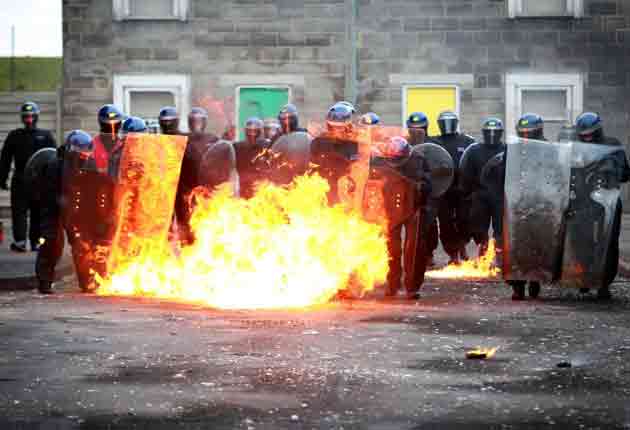Once I'd been on fire a few times, the fear wore off
Kevin Rawlinson spends a day training with the Metropolitan Police's riot squad

The petrol bomb exploded half a yard ahead and the flames billowed towards me.
They came around and under my shield and swept up towards my face. I did not see who threw it, I had been transfixed by the flaming bottle as it flew through the air; this was, after all, my first time being petrol bombed.
As the flames came up to my chest, I desperately tried to remember what I had been taught. Was it: "Hold your breath, cover up, then move through the flames before you breathe?" Or was it: "Hold, cover up, then take a breath before walking through the fire?"
It had only been moments since the instructor was taking me through it but, while the man next to me fell face first into the fire, I was suddenly unsure. I took in a lungful of fumes and realised I had got it wrong.
In the past few months, I have seen the student demonstrations turn violent while standing on the protesters' side of the barricades; yesterday I found out what it is like on the police officers' side. And today, I will once again be face to face with the men and women of the Metropolitan Police's Territorial Support Group (TSG), or "riot police" as they're more commonly known.
"Are you nervous?" I was asked when we lined up at the Met's Specialist Training Centre in Kent to collect our gear. "Nah, not really," I lied. The grin on the instructor's face confirmed he didn't believe me. "We'll get you on the qualifying run and see how you do then," he said.
TSG officers are expected to complete the 500m run once every five weeks. They carry a helmet, stab vest, shoulder and forearm armour, shin, thigh and groin guards as well as steel-toed boots and, of course, a 5'6" riot shield. They are expected to do the run in less than 2 minutes and 45 seconds.
After enduring 2 minutes of pure hell, I was running on fumes to get over the finish line. I felt I was suddenly about to be reacquainted with my breakfast. The heat under the equipment, even on a cold January morning, was indescribable and the condensation on the helmet's visor made it difficult to see.
After a breather, I was held by the hand as unit 905 – to which I had been assigned – practised simple commands. "Forward," I was told, means walk briskly in formation; as opposed to "Go," which means run.
"This is easy," I thought. But, as the instructors began hurling bricks at us, I began to forget which was which.
During the recent anti-fees protests, police officers have faced barrages of bricks, stones and bits of wood. They have even been attacked with fencing. Happily though, they have not faced petrol bombs.
Nevertheless, officers must be trained for any eventuality and I was going to have to face the flames.
The first one to come my way on the petrol bombing range was worrying. Once I had been aflame three or four times, the fear wore off, however, and I began to trust the protective clothing.
Later came a full-scale "incident". My partner screamed in my ear to lock my shield into his while our supervisor bellowed orders.
And, as the petrol bombs exploded at our feet and the police dogs' saliva dripped to the floor as they strained at their leads, barking ferociously, I realised we weren't playing any more.
Next to me, as we picked our way around the mocked-up village, was an officer who was nearly hit by the fire extinguisher thrown from the roof of 30 Millbank. Behind me was the officer it hit as it bounced.
"One of the strengths of the TSG," an instructor told me, "is that they train together, stick together and work together as a team."
As the remnants of a petrol bomb burned around my feet, I could feel the heat through my clothing. I began to back off and to look down to see if I was on fire but my partner demanded that I "stand my ground" and "look forward, face the threat".
As he did so, I realised he was relying on me not to mess up as much as I was relying on him to hold my hand.
They have worked as a team in the past and will do so again today, come what may.
While many have justifiably criticised the police reaction at past demonstrations, as my partner put it: "It's not us who decide what powers the police have, we just stand where we're told to stand and wear what we're told to wear."
